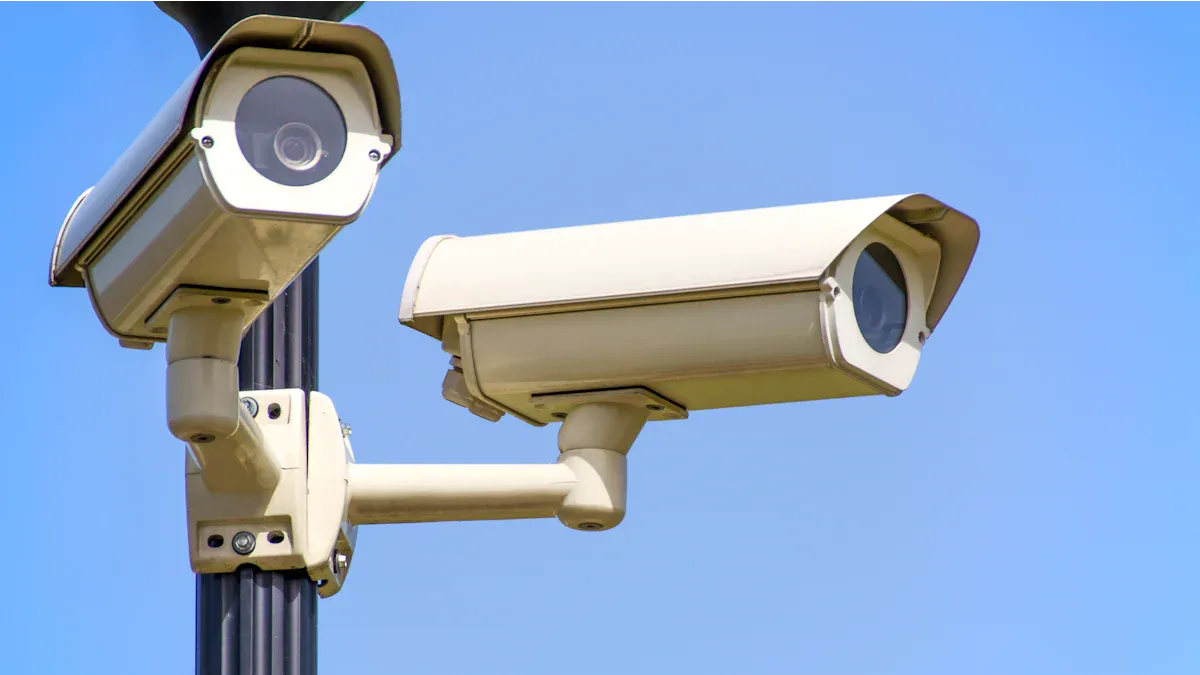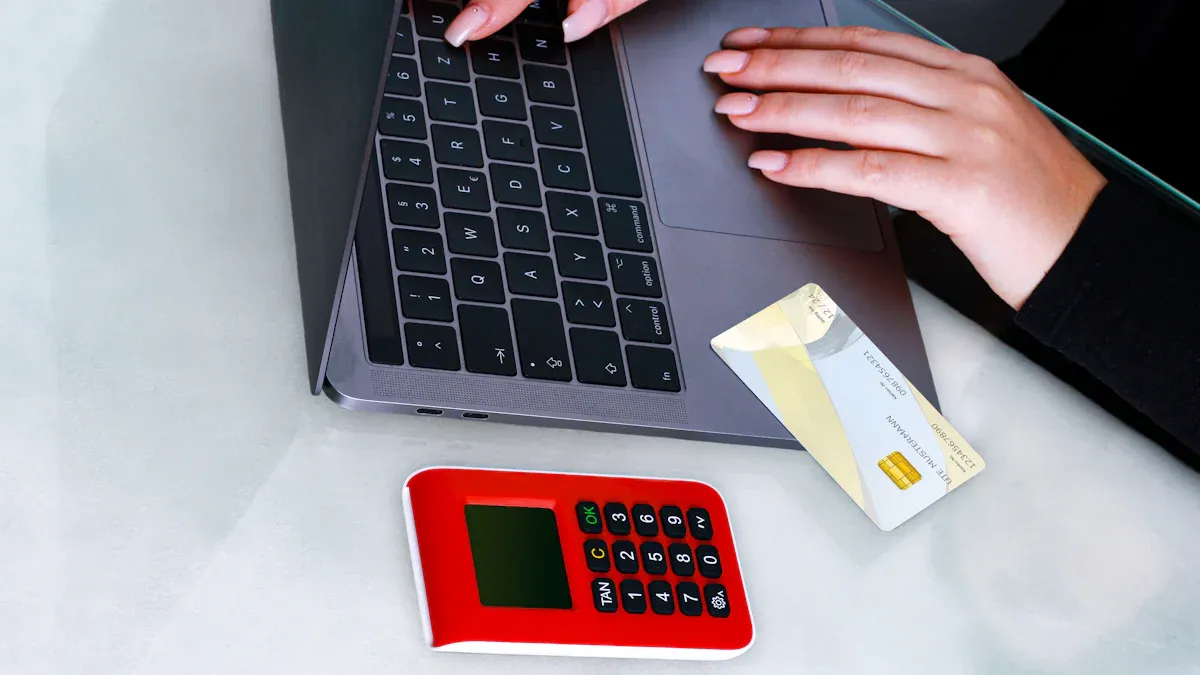- EasyCard
- Trade
- Help
- Announcement
- Academy
- SWIFT Code
- Iban Number
- Referral
- Customer Service
- Blog
- Creator
2025 Latest Methods for Security Assessment of Third-Party Payment Platforms

Image Source: pexels
With the digital transformation of global payment methods, payment security has become increasingly critical. According to PwC analysis, the volume of cashless transactions is expected to approach 1.9 trillion by 2030, especially rapid growth in the Asia-Pacific and African regions. However, third-party payment platforms also face serious security threats, including fund theft, data breaches, and system instability. Understanding what third-party transfers are requires users to be more cautious.
How to assess the security of third-party payment platforms? You need a comprehensive evaluation considering compliance, fund security, technical stability, and privacy protection. When choosing a suitable platform, pay attention not only to its service capabilities but also to effective risk mitigation. Payment security is not only about protecting personal assets but also a cornerstone for sustainable business growth.
What Is Third-Party Transfer?
Basic Definition of Third-Party Payment Platforms
Third-party payment platforms are intermediary services, independent of transacting parties, that facilitate fund transfers and payment settlements. Operated by non-financial institutions, these platforms connect banks, merchants, and consumers, acting as a bridge for secure and efficient transactions.
Development and Features
- History:
- 1998–2005: PayPal (United States) pioneered the global adoption of online payments.
- 2010s: Revolut (United Kingdom) and Wise (United Kingdom) expanded markets with low-cost cross-border transfers.
- 2020: The global third-party payment market continued to grow, driven by e-commerce and mobile payments.
- Functions: Support online shopping, cross-border transfers, bill payments, and digital wallets, simplifying traditional banking processes.
- Advantages: Faster processing (cross-border transfers typically 1–3 days), lower fees, and multi-currency support.
Overseas Policies and Companies
- Policies:
- European Union: Regulated by the Payment Services Directive 2 (PSD2), requiring Strong Customer Authentication (SCA) and Anti-Money Laundering (AML) compliance.
- United States: Governed by the Dodd-Frank Act, emphasizing consumer protection and data security.
- Singapore: The Payment Services Act, enforced by the Monetary Authority of Singapore (MAS), ensures transaction transparency.
- Company Examples:
- PayPal (United States): A global leader, supporting payments in over 190 countries.
- Wise (United Kingdom): Specializes in low-cost cross-border transfers, covering 80+ currencies.
- Stripe (United States): Provides payment processing for e-commerce and businesses, widely used in North America and Europe.
Considerations
- Fees: Generally lower than banks, but transaction or currency conversion fees may apply.
- Security: Choose regulated platforms with robust data encryption.
- Regional Limitations: Some platforms have restricted availability for certain countries or currencies; verify compatibility.
Operational Mechanism of Third-Party Transfers
The core of third-party transfers lies in an efficient and secure fund flow mechanism. When using a third-party payment platform, funds do not transfer directly from payer to payee but first enter the platform’s escrow account. After verifying transaction details, the platform transfers funds to the payee’s account. This mechanism effectively reduces transaction risks and ensures fund security.
However, third-party transfers can be exploited by criminals. For example:
- U.S. Case: In 2021, criminals used PayPal for fraudulent transfers, forging identities to move funds. The U.S. Federal Bureau of Investigation (FBI) investigated and filed charges.
- U.K. Case: In 2023, U.K. small business Giricon Limited was defrauded via an unregulated payment platform, losing millions of euros. Victim Stuart Daburn sued the perpetrators, including Giricon and related entities, through London’s High Court, exposing risks tied to unregulated platforms like Erith Global (established in Estonia in 2020, later shut down) and Lithuania-based Mirha Traders UAB. This case spurred the EU to tighten payment platform regulations.
Nonetheless, legitimate platforms employ strict risk controls and technical measures to effectively prevent such risks. When choosing a payment platform, prioritize security and compliance.
Core Methods for Security Assessment of Third-Party Payment Platforms

Image Source: pexels
Compliance and Regulation
Compliance is the foremost standard in security assessment of third-party payment platforms. A compliant platform must not only adhere to local laws and regulations but also meet international regulatory requirements, especially in cross-border payments. You can judge compliance by:
- Privacy Protection Policies: For example, China Southern Airlines implements a “Privacy Protection Policy” and “Data Processing Protection Agreement” to legally support its business activities.
- Data Protection Responsibilities: Many companies explicitly define data protection duties in partner agreements to ensure compliance.
- Transparent Data Processing Procedures: Publicizing data handling enhances users’ awareness of data rights and builds trust.
For cross-border payment platforms, compliance management is especially critical. Platforms must establish robust risk assessment mechanisms to ensure effective identity verification and anti-fraud systems. BiyaPay, as a global payment tool, strictly follows regulations in various countries and implements advanced anti-money laundering and counter-terrorism financing measures to guarantee legality and security for every transaction.
Fund Security Mechanisms
Fund security is one of the most concerned issues for users when selecting payment platforms. A reliable platform usually adopts multi-layer fund protection mechanisms, including escrow accounts, real-time monitoring, and risk alert systems. Below are some successful cases:
| Region | Institution | Key Measures | Outcome |
|---|---|---|---|
| United States | PayPal | Uses escrow accounts, encryption, and AML monitoring | Significantly reduces fraud, boosts trust |
| Germany | SAP | Implements data security frameworks and strict access controls | Ensures global data compliance |
| United Kingdom | Revolut | Employs SCA and real-time risk alerts | Enhances user fund safety and satisfaction |
BiyaPay excels in fund security. Its multi-asset trading wallet employs bank-grade encryption technology and real-time monitoring systems to ensure fund safety. Furthermore, BiyaPay supports trading of over 30 fiat currencies and 200 digital currencies, allowing users to confidently manage global assets and investments.
Technical Stability
Technical stability directly impacts user experience and security. A stable platform maintains smooth operation under high concurrency while preventing hacking and data breaches. Key evaluation points include:
- System Protection: Significant resources invested in technical and system security defenses to block unauthorized access.
- Efficient Identity Verification: Ensures authenticity of both parties in a transaction.
- Disaster Recovery Mechanisms: Robust failover plans to rapidly restore systems and minimize user loss during outages.
BiyaPay also demonstrates excellent technical stability. With daily transaction volumes exceeding 10 million USD and coverage across 100+ countries, it showcases strong technical support capabilities. Whether for online remittance or investment trading, BiyaPay offers stable and efficient services.
User Privacy Protection
User privacy protection is a crucial factor when choosing third-party payment platforms. Platforms must employ both technological and policy measures to safeguard user data security and legality. Evaluate platforms by:
- Zero-Trust Architecture: Every access request requires verification, preventing unauthorized internal access.
- End-to-End Encryption: Data is encrypted throughout transmission and storage, preventing leaks.
- Differential Privacy: Adds statistical noise to protect individual data while maintaining analysis accuracy.
- Attribute-Based Access Control: Fine-grained permission management ensures only authorized users access sensitive info.
- Legal Compliance: Strict adherence to laws governing data processing.
- User Rights Protection: APIs provided for users to query and manage their data, respecting privacy rights.
BiyaPay stands out in privacy protection by adopting end-to-end encryption and zero-trust architecture, safeguarding user data throughout transmission and storage. These measures enhance user trust and lay a solid foundation for long-term corporate development.
Tip: Regularly review privacy policy updates when using payment platforms to ensure your data is always protected.
Key Factors in Choosing Payment Platforms
Global Payment Capability
Global payment capability is a vital criterion. An excellent platform supports multiple currency transactions and meets payment needs across regions. Evaluate by:
- Market Coverage: Whether the platform supports cross-border payments covering major economies and emerging markets.
- Transaction Volume and Growth: For example, the global payment orchestration market size is projected to reach 3.87 billion USD by 2025, growing to 17.29 billion USD by 2032 at a CAGR of 23.84%.
- Localization Services: Ability to customize according to local payment habits.
BiyaPay excels globally, with a multi-asset wallet supporting over 30 fiat and 200 digital currencies, covering 100+ countries. It provides efficient, secure global payment solutions for individuals and enterprises.
Fees and Cost Efficiency
Fees and cost efficiency directly affect platform choice. Assess whether the fee structure is reasonable and analyze cost-benefit ratios. Common methods include:
- Cost-Benefit Analysis (CBA)
- Sensitivity Analysis
- Risk Assessment
- Opportunity Cost Method
- Discounted Cash Flow Analysis
Also important are fee-to-benefit comparisons, indicator systems, and optimization analyses. These help determine whether a platform provides economically efficient payment services. BiyaPay employs transparent fees, public exchange rates, and no hidden charges, maximizing users’ fund efficiency.
Customer Service and Support
Customer service reflects platform competitiveness. User satisfaction surveys (example) help evaluate service quality. Key steps include:
- Collecting user feedback to understand real customer sentiment.
- Data analysis to identify main issues.
- Implementing improvement measures to optimize experience.
Platforms use questionnaires and social media interaction to comprehensively understand user needs and adjust strategies timely. BiyaPay offers 24/7 support, ensuring quick help when needed. Its efficient service system is widely recognized globally.
Tip: Prioritize platforms offering comprehensive support and continual service optimization. This boosts user experience and strengthens business growth.
Practical Suggestions for Payment Risk Prevention

Image Source: pexels
Preventing payment risks is key to safeguarding funds and user privacy. Through scientific account management, information protection, and transaction record retention, you can significantly reduce risks.
Account Security Management
Account security is the first defense against payment risks. Measures include:
- Enable Two-Factor Authentication (2FA): SMS codes, dynamic passwords, or biometrics (fingerprint, facial recognition) add extra security layers.
- Regular Password Changes: Use complex passwords updated periodically, avoiding guessable info like birthdays or phone numbers.
- Limit Device Access: Bind frequently used devices, disallow unknown device logins.
- Real-Time Account Activity Monitoring: Receive alerts on logins and transactions.
BiyaPay excels in account security. Its multi-asset wallet uses bank-grade encryption and supports 2FA, ensuring account safety. Real-time monitoring quickly detects anomalies, issuing immediate alerts.
Tip: Regularly check login history and change passwords promptly if suspicious activity occurs.
Information Protection
Information security is core to payment safety. Platforms must ensure data confidentiality and integrity by:
- Data Encryption: End-to-end encryption protects data in transit and storage.
- Privacy Protection Technologies: Differential privacy and zero-trust architecture prevent unauthorized access and leaks.
- Regular Permission Reviews: Ensure only necessary personnel or devices access sensitive data.
- Manual Review Mechanisms: Incorporate human oversight to avoid leaks caused by algorithm flaws.
Successful cases highlight effective info protection:
| Case | Recommended Measures |
|---|---|
| SPD Bank deploying 30,000 monitoring rules | Real-time data alerts, metadata lineage analysis, enhanced traceability |
| Financial AI facing data pollution risk | Combine technical and managerial controls; privacy tech as standard; manual content review |
BiyaPay performs excellently in info protection with end-to-end encryption and zero-trust models, ensuring data security.
Tip: Regularly update privacy settings to keep your data protected.
Transaction Record Retention
Complete transaction record keeping is both a legal requirement and a user right safeguard. Key practices include:
- Secure Storage Technologies: Ensure integrity and recoverability.
- Regular Backups: Cloud or local backups prevent data loss due to system failures.
- Compliance with Laws: Follow record retention regulations to ensure legality and traceability.
- Comprehensive Security Systems: From data classification to storage management, improve governance.
The table below shows legal and technical requirements for transaction record retention:
| Evidence Content | Description |
|---|---|
| Commercial banks must retain transaction records per laws | Adopt necessary procedures and technologies to ensure data completeness, security, and recoverability |
BiyaPay offers strong support in record keeping. Its multi-asset wallet allows users to query historical transactions anytime and employs advanced storage tech to guarantee data integrity and security, enhancing trust.
Tip: Regularly download and backup records for quick access when needed.
By following these measures, you can greatly reduce payment risks and protect account security and privacy. Choosing a security- and compliance-focused platform like BiyaPay provides strong backing for your fund management and investment activities.
Security assessment methods for payment platforms are essential. They help identify potential risks and provide multi-layer protections for your funds and privacy. Choosing a secure platform not only safeguards personal assets but also lays the foundation for enterprise globalization.
In the future, payment security will increasingly rely on data analytics and technological innovation. The following common analytical methods help predict security trends:
| Analytical Method | Description |
|---|---|
| Porter’s Five Forces | Industry competitive analysis |
| PEST Analysis | External environment evaluation |
| Predictive Analytics | Forecasting future trends |
| Risk Analysis | Identifying potential risks |
These methods enable platforms to better address emerging threats and ensure transaction security and stability. Choosing a platform like BiyaPay, which values security and compliance, offers a more reliable payment experience.
FAQ
1. How to determine if a payment platform meets compliance requirements?
Check whether the platform holds relevant payment licenses issued by regulatory authorities and review its privacy policy and data protection measures. Compliance info is usually found in the “About Us” or “Legal Notices” section of the official website.
2. How long must third-party payment platforms keep transaction records?
According to laws in various countries, records usually must be kept for 5 to 10 years. Check the platform’s user agreement or customer support for specific retention periods.
3. How to protect account security when using payment platforms?
Enable two-factor authentication, change passwords regularly, bind frequently used devices, and monitor account activities. Platforms offering real-time alerts and anomaly detection, like BiyaPay, further enhance security.
4. Why is privacy protection so important for payment platforms?
Privacy protection prevents misuse or leakage of user data, ensuring transaction security. Platforms adopting end-to-end encryption and zero-trust architecture can effectively reduce data breach risks.
5. How to choose a suitable third-party platform for cross-border payments?
Evaluate global payment capabilities, including supported currencies, covered countries and regions, transaction speed, and fee transparency. BiyaPay supports over 30 fiat and 200 digital currencies and is a trustworthy choice.
Tip: When choosing payment platforms, prioritize those with good user reviews and robust security measures.
*This article is provided for general information purposes and does not constitute legal, tax or other professional advice from BiyaPay or its subsidiaries and its affiliates, and it is not intended as a substitute for obtaining advice from a financial advisor or any other professional.
We make no representations, warranties or warranties, express or implied, as to the accuracy, completeness or timeliness of the contents of this publication.




Contact Us
Company and Team
BiyaPay Products
Customer Services
is a broker-dealer registered with the U.S. Securities and Exchange Commission (SEC) (No.: 802-127417), member of the Financial Industry Regulatory Authority (FINRA) (CRD: 325027), member of the Securities Investor Protection Corporation (SIPC), and regulated by FINRA and SEC.
registered with the US Financial Crimes Enforcement Network (FinCEN), as a Money Services Business (MSB), registration number: 31000218637349, and regulated by FinCEN.
registered as Financial Service Provider (FSP number: FSP1007221) in New Zealand, and is a member of the Financial Dispute Resolution Scheme, a New Zealand independent dispute resolution service provider.



















